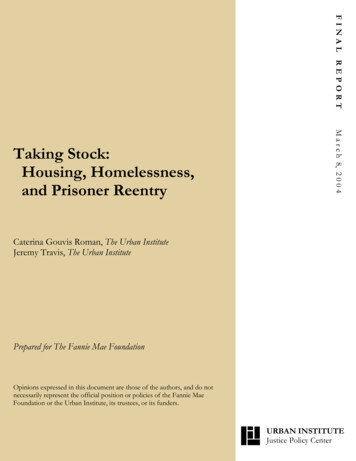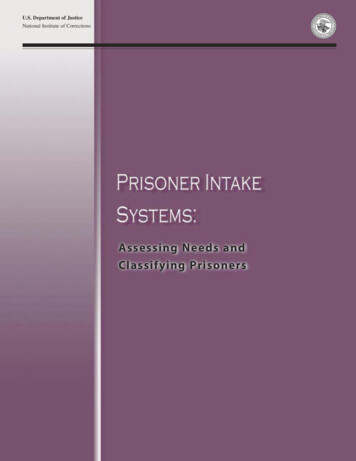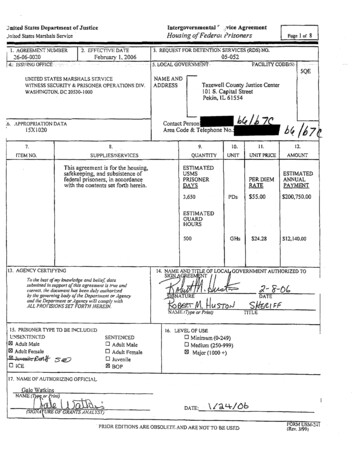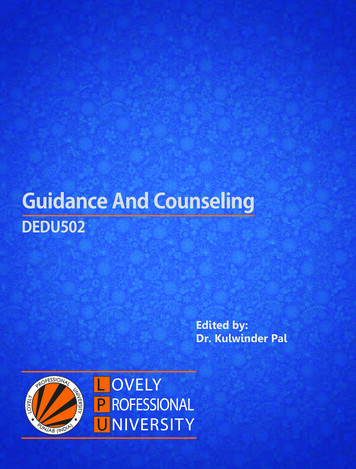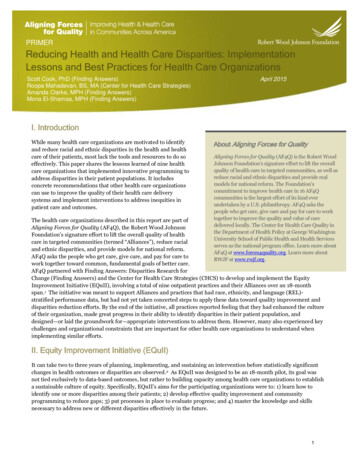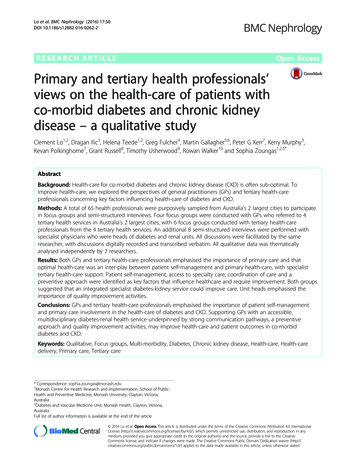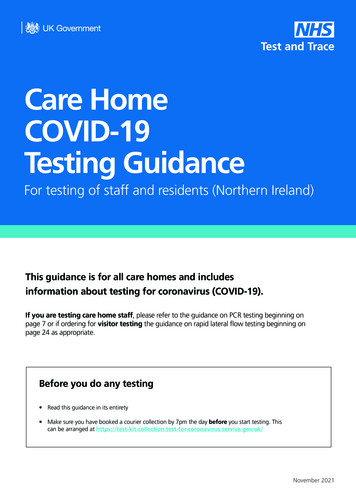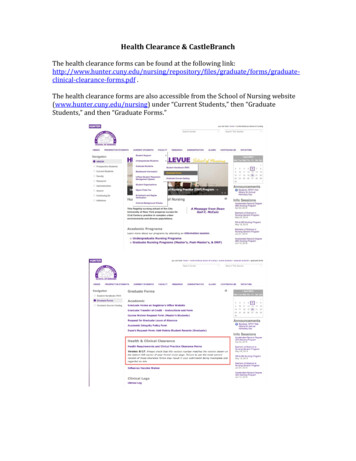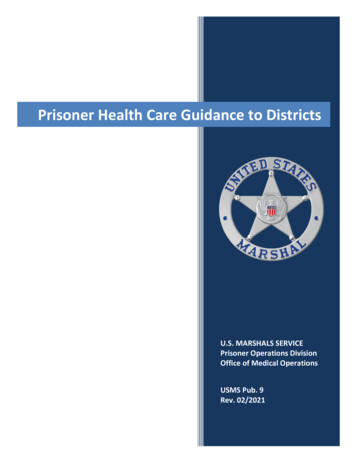
Transcription
Prisoner Health Care Guidance to DistrictsU.S. MARSHALS SERVICEPrisoner Operations DivisionOffice of Medical OperationsUSMS Pub. 9Rev. 02/2021
PRISONER HEALTH CARE GUIDANCE TO DISTRICTSA.B.C.Introduction: This publication is a supplement to the United States Marshals Service (USMS)Policy Directive 9.4, Prisoner Health Care Management.1.These guidelines refer to health care services that are to be charged to the USMS and/orare provided outside of the detention/correctional facility.2.The USMS has authority to acquire and pay for reasonable, medically necessary care (toinclude emergency medical care) to ensure the well-being of all prisoners in USMScustody.3.In accordance with the applicable Intergovernmental Agreement or contract, all health careservices provided by the detention/correctional facility to USMS prisoners at no cost areallowable.4.Districts can approve requests for prisoner health care services without review by PrisonerOperations Division (POD), Office of Medical Operations (OMO) if they are specified in thispublication.5.All requests for prisoner health care services not listed in this publication must beadjudicated by POD, OMO. Districts cannot defer/deny requests for prisoner medical care.6.In some instances, medically appropriate, non-urgent health care services can be deferreduntil the prisoner is released from USMS custody, as long as there is no significant healthrisk to the prisoner. This determination however still requires POD, OMO adjudication.Definitions:1.Medically Necessary Care: Refer to USMS Policy Directive 9.4, Prisoner Health CareManagement.2.Health Care Provider: Licensed practitioner that provides health care to prisoners inUSMS custody, including but not limited to physicians, psychiatrists, dentists, mid-levelpractitioners (e.g., nurse practitioners, physician assistants).Approved Health Care Services for Prisoners in USMS Custody. Districts may approve thefollowing requests from a detention facility health care provider for prisoner health care services orthey may refer these requests to POD, OMO for adjudication. Requests for health care servicesoriginating from outside the detention facility will be forwarded to POD, OMO for adjudication.1.2.USMS Pub. 9Cardiology - If the prisoner has been examined by an appropriate health care providerwith a written recommendation for any of the following tests:a.Consultation.b.Electrocardiogram (EKG or ECG).Dental:a.Focused dental examination and dental x-rays in the presence of pain andsuffering.b.Extractions and/or fillings ONLY to relieve active (not potential or possible) painand suffering as recommended by a dentist.c.Removal of braces or dental hardware, if causing pain, discomfort, or infection.Page 2 of 5
PRISONER HEALTH CARE GUIDANCE TO DISTRICTS3.d.Replacement or repair of upper or lower dentures, including partial dentures, onlyif broken or lost while in USMS custody (one replacement is authorized, withappropriate documentation).e.Routine dental hygiene for prisoners in the uninterrupted custody of the USMS forgreater than 12 months.Durable Medical Equipment necessitated by an acute injury while in USMS custody; or ifthe equipment was in the prisoner’s possession at the time of arrest and lost or damagedbeyond repair during incarceration is limited to (with appropriate documentation):a.Cane.b.Crutches.c.Standard wheelchair.d.Walker.Note: Districts will contact OMO, Medical Audit Branch for guidance regardingthe payment for these and any Durable Medical Equipment.4.Emergency Care. No prior authorization is required for emergency care. Districts willnotify POD, OMO via the Prisoner Medical Management (PMM) module in the USMSMission System of the following:a.Emergency hospitalizations/surgeries.b.Dental emergencies.c.Psychiatric emergencies.5.General Medicine visits to outside health care providers for evaluation of clinicalsymptoms or management of chronic care conditions (e.g., hypertension, diabetes,HIV/AIDS), if detention facility has no primary medical provider at the facility.6.Hearing Aids and Batteries:7.USMS Pub. 9a.Replacement hearing aids, if broken or lost while in custody (one replacement pairis authorized with appropriate documentation).b.Replacement hearing aid batteries.Laboratory Tests for evaluation of clinical symptoms or management of chronic careconditions.a.CBC (Complete Blood Count).b.BMP (Basic Metabolic Profile).c.CMP (Complete Metabolic Profile).d.HgBA1C (Hemoglobin A1C).e.TSH (Thyroid Stimulating Hormone).f.Lipid Profile.g.LFT (Liver Function Test).Page 3 of 5
PRISONER HEALTH CARE GUIDANCE TO DISTRICTSh.PT/INR (Prothrombin/International Normalized Ratio).i.PTT (Prothrombin Time).j.Thyroid Panel.k.Therapeutic Medication Levels (except for Keppra, (Levetiracetam)).l.UA (Urinalysis).m.Wound Cultures.n.Urine Cultures (NOT including Gonorrhea /Chlamydia).o.Potassium Level.p.Magnesium Level.q.Cardiac Enzymes.r.Liver enzymes (AST (Aspartate transaminase (formerly SGOT), ALT (Alanineaminotransferase (previously called SGPT) and Alkaline phosphatase).s.CD4 Count.t.HIV Viral Load.8.Mental Health/Psychology/Psychiatry Consults for emergencies, suicide risk, risk ofhurting self or others, or medication adjustment.9.Obstetrics/Gynecology (OBGYN):a.Tests to confirm pregnancy diagnosis (blood or urine).b.Prenatal care Routine OB visits.1) Prenatal vitamins.2) Routine Lab tests.3) One ultrasound.10.USMS Pub. 9c.Hospital and delivery care of mother (a maximum of 48 hours hospitalization aftervaginal delivery and 72 hours after delivery by cesarean section).d.Postpartum follow-up.e.Mammograms for prisoners who are 50 years of age AND have been in theuninterrupted custody of the USMS for greater than 12 months.f.Routine GYN examinations including PAP smear, for prisoners in theuninterrupted custody of the USMS for greater than 12 months.Optometry/Ophthalmology if eyeglasses were broken or lost in USMS custody, withappropriate documentation.a.Only one replacement pair is authorized.b.No designer frames.Page 4 of 5
PRISONER HEALTH CARE GUIDANCE TO DISTRICTSc.11.Most cost-effective pair that meets facility requirements.Orthopedics:a.Consultation, if the prisoner has been examined by an appropriate health careprovider, with a written recommendation.b.X-rays.12.Oxygen (only with written recommendation by a health care provider).13.Pharmacy medications can be approved by the district with exceptions noted below:a.Birth control pills or devices.b.Narcotic medications including methadone, except for:Treatment of opiate addicted pregnant prisoners.Detoxification of opiate addicted prisoners.Treatment of severe pain.c.Medications for Hepatitis C.d.Medications for cosmetic purposes or to enhance athletic or sexual performance.e.Investigational medications.f.Medications for hair loss.g.Individual prescription drug greater than 1,800 per month.h.Over-the-counter (OTC) medications listed here (these are covered by the facility).Note: Districts should not be receiving medication requests from facilities participating inthe NMCC Pharmacy Program.14.Post-Surgery follow-up appointments.15.Radiology:USMS Pub. 9a.Diagnostic x-rays, with a written recommendation by an appropriate health careprovider to evaluate injury, pain or discomfort, clinical symptoms or findings, or forinfectious disease screening.b.Ultrasounds to evaluate pain, discomfort, or clinical symptoms, with a writtenrecommendation by an appropriate health care provider.c.Mammograms for prisoners who are 50 years of age AND have been in theuninterrupted custody of the USMS for greater than 12 months.d.No CT, MRI or PET scan procedures are approvable under Publication 9.Page 5 of 5
Treatment of severe pain. c. Medications for Hepatitis C. d. Medications for cosmetic purposes or to enhance athletic or sexual performance. e. Investigational medications. f. Medications for hair loss. g. Individual prescription drug greater than 1,800 per month. h. Over-the-counter (OTC) medications listed here (these are covered by the .
